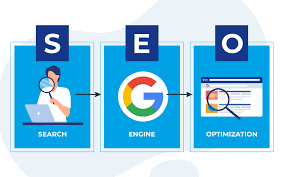If you’re aiming to improve your website’s visibility and attract more traffic, focusing on your organic search ranking is essential. With Google constantly updating its algorithms, it can be challenging to keep up with best practices.
However, by leveraging effective strategies and working with an organic SEO agency, you can enhance your website’s chances of appearing on the first page of Google. This article will cover actionable tips for optimizing your site and driving long-term results with organic SEO services.
Understand Your Target Audience
The foundation of any effective SEO strategy is understanding who you’re trying to reach. Defining your target audience allows you to tailor your content to their interests and needs.
Research User Intent: Analyze what your audience searches for and the keywords they use.
Create User Personas: Develop personas based on demographics, interests, and online behaviour.
Adjust Content Strategy: Use the insights to guide your content, ensuring it addresses your audience’s questions and pain points.
With this approach, you’ll create relevant and engaging content that keeps visitors on your site longer.
Conduct Thorough Keyword Research
Keywords are essential for SEO, helping Google understand what your site is about. A well-researched list of keywords will guide your content creation and boost your chances of ranking.
Use Long-Tail Keywords: These are more specific and often less competitive, giving you a better chance to rank.
Focus on Relevancy: Choose keywords that closely align with your products, services, or industry.
Optimize Keywords Naturally: Avoid keyword stuffing; instead, use keywords naturally within your content.
Keyword research tools like Google Keyword Planner, SEMrush, and Ahrefs can help you uncover valuable keywords to target.
Optimize On-Page Elements
On-page SEO includes elements that you can control on your website, and optimizing these factors can significantly impact your ranking.
Key On-Page Optimization Techniques:
Title Tags: Use primary keywords in your titles to signal relevance to search engines.
Meta Descriptions: Write compelling, concise meta descriptions that encourage clicks.
Headers (H1, H2, H3): Structure your content with headers to improve readability and help search engines understand the content hierarchy.
Image Alt Text: Describe images with alt text that includes keywords to boost SEO and improve accessibility.
By optimizing these elements, you make it easier for Google to understand your content, increasing the likelihood of ranking higher.
Enhance Website Speed and Mobile Friendliness
Google prioritizes websites that load quickly and are optimized for mobile devices. By improving these aspects, you enhance user experience and increase your chances of ranking higher.
Compress Images: Use tools to reduce image sizes without losing quality.
Minimize HTTP Requests: Reduce the number of elements on each page to speed up loading times.
Enable Browser Caching: Store frequently used data on users’ devices for faster page load.
Use a Responsive Design: Ensure your website adjusts to different screen sizes and provides a smooth mobile experience.
Working with an organic SEO agency can be beneficial here, as they can help you optimize technical aspects of your site for better performance.
Create High-Quality, Valuable Content
Content is at the heart of SEO, and Google favours websites that provide relevant, informative, and engaging content. Regularly publishing quality content can help you attract organic traffic and establish your authority.
Tips for Creating Effective Content:
Focus on User Intent: Ensure content answers users’ questions and provides solutions.
Use a Conversational Tone: Make your content engaging and easy to understand.
Include Visuals: Add images, videos, or infographics to enhance user engagement.
Publish Consistently: Regularly update your blog or resource section to stay relevant.
An organic SEO agency can assist in creating a content strategy tailored to your business, allowing you to focus on building a connection with your audience.
Build a Strong Backlink Profile
Backlinks from reputable sites are crucial for SEO, as they act as endorsements for your content. However, quality matters more than quantity, so focus on acquiring links from authoritative sites.
Guest Posting: Write articles for other sites in your niche, linking back to your content.
Reach Out to Influencers: Ask industry experts to share or link to your content.
Utilize Social Media: Share your content on social platforms to attract more visitors and potential backlinks.
With effective organic SEO services, you can implement link-building strategies that increase your credibility and help you achieve a higher Google ranking.
Improve User Experience and Site Navigation
A well-designed website with intuitive navigation improves user engagement and signals to Google that your site is valuable.
Use Clear Menus: Make it easy for visitors to find what they’re looking for.
Reduce Bounce Rates: Keep users on your site longer by offering engaging content and a seamless browsing experience.
Optimize for Accessibility: Ensure your site is accessible to all users, including those with disabilities.
When users can easily navigate your site and find what they need, they’re more likely to stay longer and return, which positively impacts your ranking.
Use Local SEO for Targeted Traffic
If you’re a local business, optimizing for local search results can attract more visitors to your area. By integrating local keywords and creating a Google My Business profile, you can enhance visibility.
Steps for Local SEO Success:
Claim Your Google My Business Profile: Ensure all information is accurate and up-to-date.
Include Local Keywords: Use local keywords naturally in your content and metadata.
Encourage Reviews: Positive reviews on Google help improve your business’s credibility and visibility.
An organic SEO agency specializing in local SEO can help you reach your target audience more effectively within your geographic area.
Monitor and Measure Your SEO Efforts
SEO requires ongoing adjustments. Track your performance to identify what works and where you need to improve.
Use Google Analytics: Analyze traffic patterns, bounce rates, and conversion data.
Track Keyword Rankings: Use tools like Ahrefs or SEMrush to monitor your keyword performance.
Analyze Competitors: Identify gaps in your strategy by examining competitors’ strengths.
With consistent monitoring, you can refine your strategy and achieve sustainable growth.


